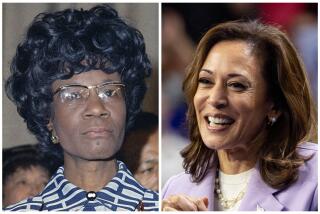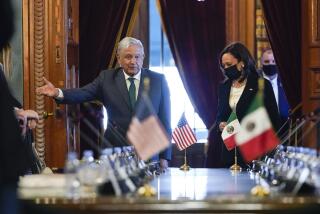Hillary Makes Her Case, but Abroad
- Share via
Silenced in her in own country, Hillary Rodham Clinton has realized that her progressive agenda is so unacceptable to Americans (and probably to the president) that she must export her ideas to other continents.
During her visit to India, for example, the first lady publicized the success of development programs that loan village women small sums of money with which to start their own cottage businesses. According to the banks that have funded them, the women rapidly paid back the loans, gained a degree of economic independence and raised their standard of living. When the first lady returned home, she called for American financial institutions to offer small loans to poor American women, whom banks usually reject. Small enterprises, she argued, might free poor women from their dependence on welfare or abusive relationships. Most Americans probably have never heard about her advocacy of these development programs.
When Clinton changes her hair style, reporters seek a political explanation and muse about the symbolic meaning of her new coiffure. Even when the first lady travels abroad, the American media ignore or trivialize her speeches and send back “exotic” pictures that show her and her daughter riding an elephant, stalking hippos with binoculars, admiring floral displays and shopping at local markets.
At the U.N. Fourth World Conference on Women in Beijing in 1995, the first lady’s speech boldly defended women’s rights as human rights. Put another way, she promoted the universal right to call a custom--mutilation, sexual slavery, arranged marriage, rape, dowry deaths or wife beating--a crime. When asked later about the conference, most Americans remembered stories about rain, mud and Chinese interference, but had no idea what Clinton spoke about.
Hillary and Chelsea went on a two-week tour in March of six African nations. People who should know better described her journey as a goodwill trip. It was that--and more. In each country she visited, Clinton held meetings with highly educated and powerful women leaders and publicized what she learned from them.
In Zimbabwe, a group of women painted a bleak and dismal picture of women’s lives in their country. More than a million people are infected with the AIDS virus in that nation, but men rarely disclose the infection to their wives. Husbands routinely beat their wives, even those who are highly educated. The men, moreover, blame women for causing the violence “because they have poor manners” or are wearing pants and “deserve to be beaten for trying to mimic the man’s function.”
In Tanzania, women told her that they desperately need better reproductive health care, lack basic educational and vocational opportunities and feel helpless to prevent widespread domestic violence.
Only outside the United States could Hillary Rodham Clinton respond by criticizing the widespread poverty and violence that many American women endure as well. The great tragedy is that this brilliant and enigmatic first lady has been unable, or unwilling, to protect poor women and children in her own country. When the president signed the so-called welfare reform legislation, the first lady stood mute as he dismantled the only safety net that has allowed millions of the nation’s poor to survive.
Bowing to political reality, Hillary Clinton has reinvented the first lady’s role in ways that few have grasped. Prevented from promoting a progressive agenda here, she has turned herself into an international activist who challenges patriarchal customs and sows subversive ideas abroad. When outside American borders, she has boldly criticized what feminists in Eastern Europe call “male democracies.” In Asia and Africa as well as at the world forum in Beijing, she has championed women’s human rights and promoted development programs that could lift women and children--the poorest group among the world’s population--out of grinding poverty.
It is difficult to predict Hillary Clinton’s future place in history. The first lady is no saint. Whatever the truth about her political sins and scandals, her greatest contribution as first lady has been to promote an expanded vision of democracy. In every nation she has visited, she has argued that a democracy cannot succeed if it devalues women, a simple but subversive proposition that may have greater impact than anything the president has done during his presidency.
More to Read
Sign up for Essential California
The most important California stories and recommendations in your inbox every morning.
You may occasionally receive promotional content from the Los Angeles Times.










